Critical Analysis: Sustainability in Marketing Practices
VerifiedAdded on 2019/12/04
|7
|1992
|242
Report
AI Summary
This report provides a critical analysis of an academic article focusing on sustainability in marketing. It begins by defining marketing and its potential environmental impact, emphasizing the importance of sustainable practices and economic sustainability. The report explores the concept of environment dominance, highlighting the interdependence of the global economy and ecology. It then contrasts conventional and sustainable marketing, detailing the key differences in their approaches and objectives. Macro marketing and management are also discussed, emphasizing the need for businesses to consider the natural environment in their activities. The report further outlines the benefits of sustainability in marketing and management, such as enhanced brand image and competitive advantage. Finally, the report concludes by summarizing the importance of sustainability for the long-term success of businesses and society, highlighting the significance of integrating environmental, social, and economic considerations into marketing strategies.
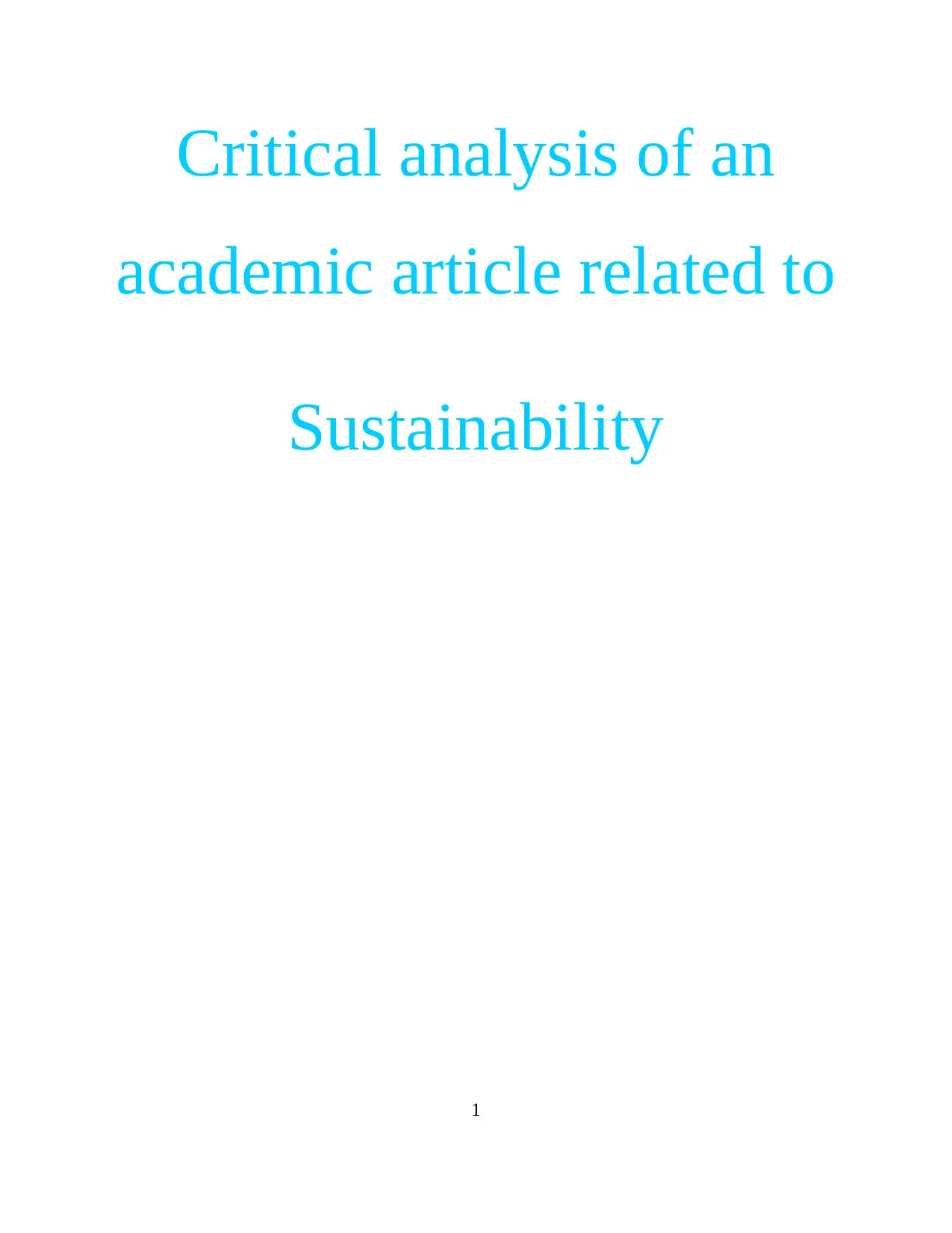
Critical analysis of an
academic article related to
Sustainability
1
academic article related to
Sustainability
1
Paraphrase This Document
Need a fresh take? Get an instant paraphrase of this document with our AI Paraphraser
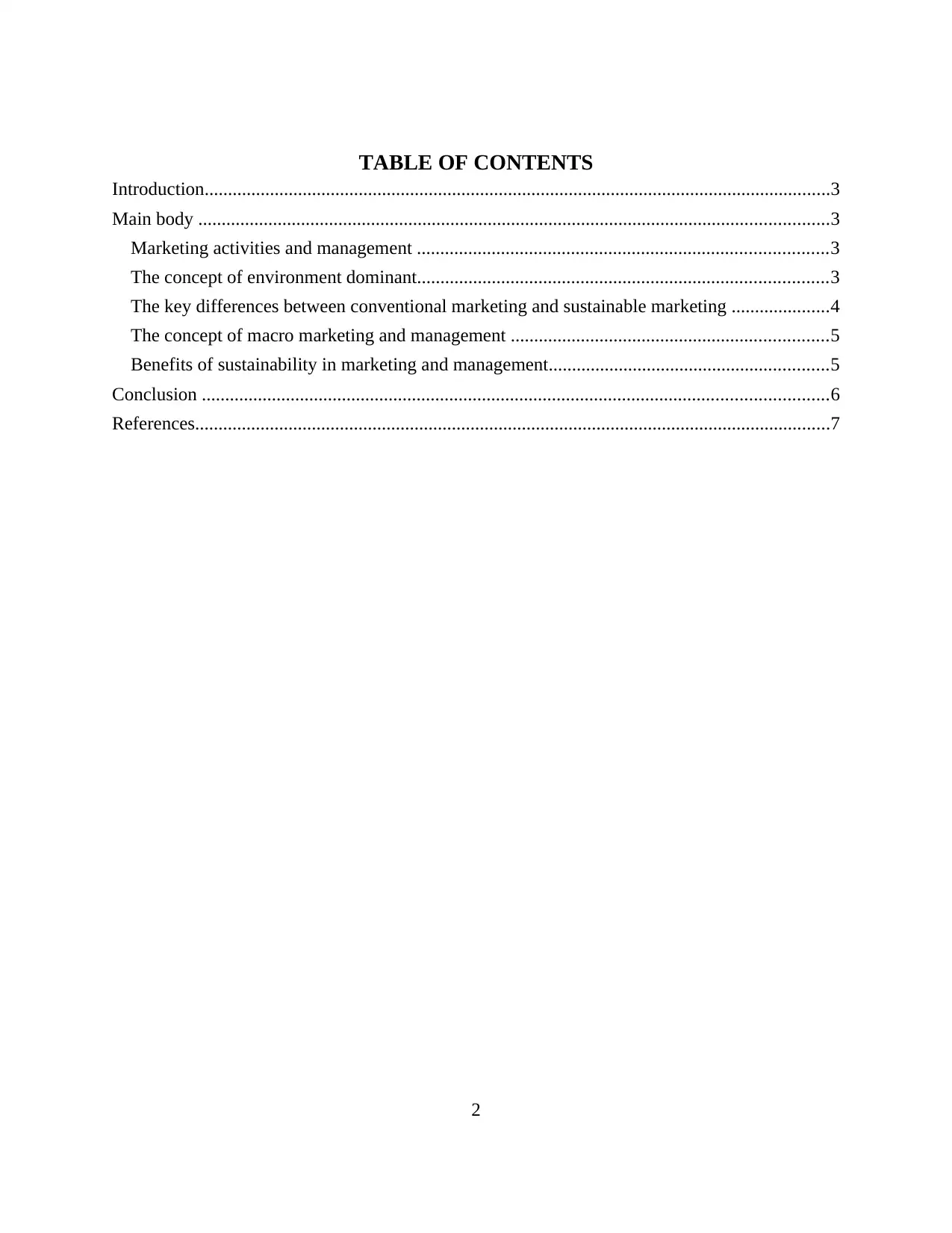
TABLE OF CONTENTS
Introduction......................................................................................................................................3
Main body .......................................................................................................................................3
Marketing activities and management ........................................................................................3
The concept of environment dominant........................................................................................3
The key differences between conventional marketing and sustainable marketing .....................4
The concept of macro marketing and management ....................................................................5
Benefits of sustainability in marketing and management............................................................5
Conclusion ......................................................................................................................................6
References........................................................................................................................................7
2
Introduction......................................................................................................................................3
Main body .......................................................................................................................................3
Marketing activities and management ........................................................................................3
The concept of environment dominant........................................................................................3
The key differences between conventional marketing and sustainable marketing .....................4
The concept of macro marketing and management ....................................................................5
Benefits of sustainability in marketing and management............................................................5
Conclusion ......................................................................................................................................6
References........................................................................................................................................7
2
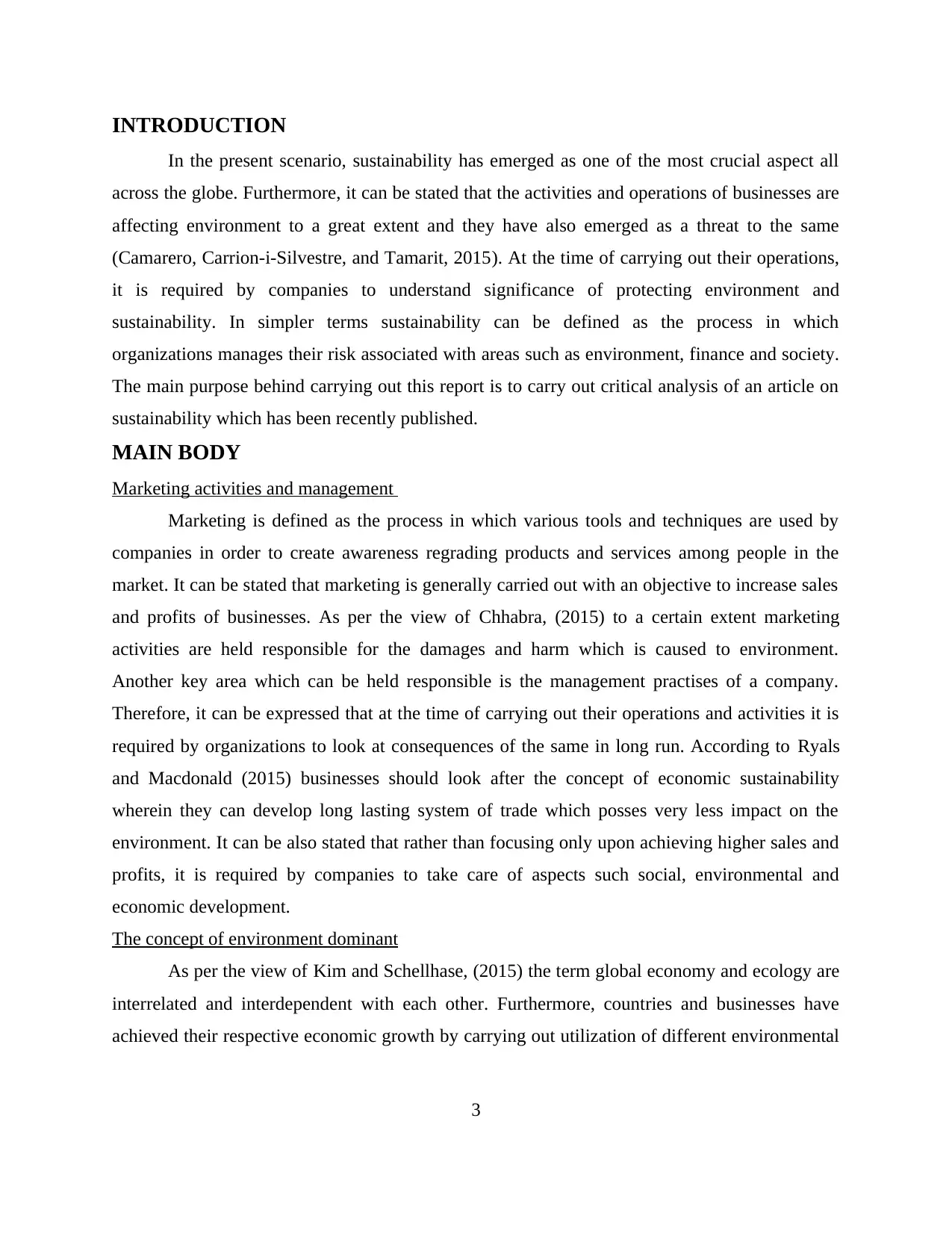
INTRODUCTION
In the present scenario, sustainability has emerged as one of the most crucial aspect all
across the globe. Furthermore, it can be stated that the activities and operations of businesses are
affecting environment to a great extent and they have also emerged as a threat to the same
(Camarero, Carrion‐i‐Silvestre, and Tamarit, 2015). At the time of carrying out their operations,
it is required by companies to understand significance of protecting environment and
sustainability. In simpler terms sustainability can be defined as the process in which
organizations manages their risk associated with areas such as environment, finance and society.
The main purpose behind carrying out this report is to carry out critical analysis of an article on
sustainability which has been recently published.
MAIN BODY
Marketing activities and management
Marketing is defined as the process in which various tools and techniques are used by
companies in order to create awareness regrading products and services among people in the
market. It can be stated that marketing is generally carried out with an objective to increase sales
and profits of businesses. As per the view of Chhabra, (2015) to a certain extent marketing
activities are held responsible for the damages and harm which is caused to environment.
Another key area which can be held responsible is the management practises of a company.
Therefore, it can be expressed that at the time of carrying out their operations and activities it is
required by organizations to look at consequences of the same in long run. According to Ryals
and Macdonald (2015) businesses should look after the concept of economic sustainability
wherein they can develop long lasting system of trade which posses very less impact on the
environment. It can be also stated that rather than focusing only upon achieving higher sales and
profits, it is required by companies to take care of aspects such social, environmental and
economic development.
The concept of environment dominant
As per the view of Kim and Schellhase, (2015) the term global economy and ecology are
interrelated and interdependent with each other. Furthermore, countries and businesses have
achieved their respective economic growth by carrying out utilization of different environmental
3
In the present scenario, sustainability has emerged as one of the most crucial aspect all
across the globe. Furthermore, it can be stated that the activities and operations of businesses are
affecting environment to a great extent and they have also emerged as a threat to the same
(Camarero, Carrion‐i‐Silvestre, and Tamarit, 2015). At the time of carrying out their operations,
it is required by companies to understand significance of protecting environment and
sustainability. In simpler terms sustainability can be defined as the process in which
organizations manages their risk associated with areas such as environment, finance and society.
The main purpose behind carrying out this report is to carry out critical analysis of an article on
sustainability which has been recently published.
MAIN BODY
Marketing activities and management
Marketing is defined as the process in which various tools and techniques are used by
companies in order to create awareness regrading products and services among people in the
market. It can be stated that marketing is generally carried out with an objective to increase sales
and profits of businesses. As per the view of Chhabra, (2015) to a certain extent marketing
activities are held responsible for the damages and harm which is caused to environment.
Another key area which can be held responsible is the management practises of a company.
Therefore, it can be expressed that at the time of carrying out their operations and activities it is
required by organizations to look at consequences of the same in long run. According to Ryals
and Macdonald (2015) businesses should look after the concept of economic sustainability
wherein they can develop long lasting system of trade which posses very less impact on the
environment. It can be also stated that rather than focusing only upon achieving higher sales and
profits, it is required by companies to take care of aspects such social, environmental and
economic development.
The concept of environment dominant
As per the view of Kim and Schellhase, (2015) the term global economy and ecology are
interrelated and interdependent with each other. Furthermore, countries and businesses have
achieved their respective economic growth by carrying out utilization of different environmental
3
⊘ This is a preview!⊘
Do you want full access?
Subscribe today to unlock all pages.

Trusted by 1+ million students worldwide
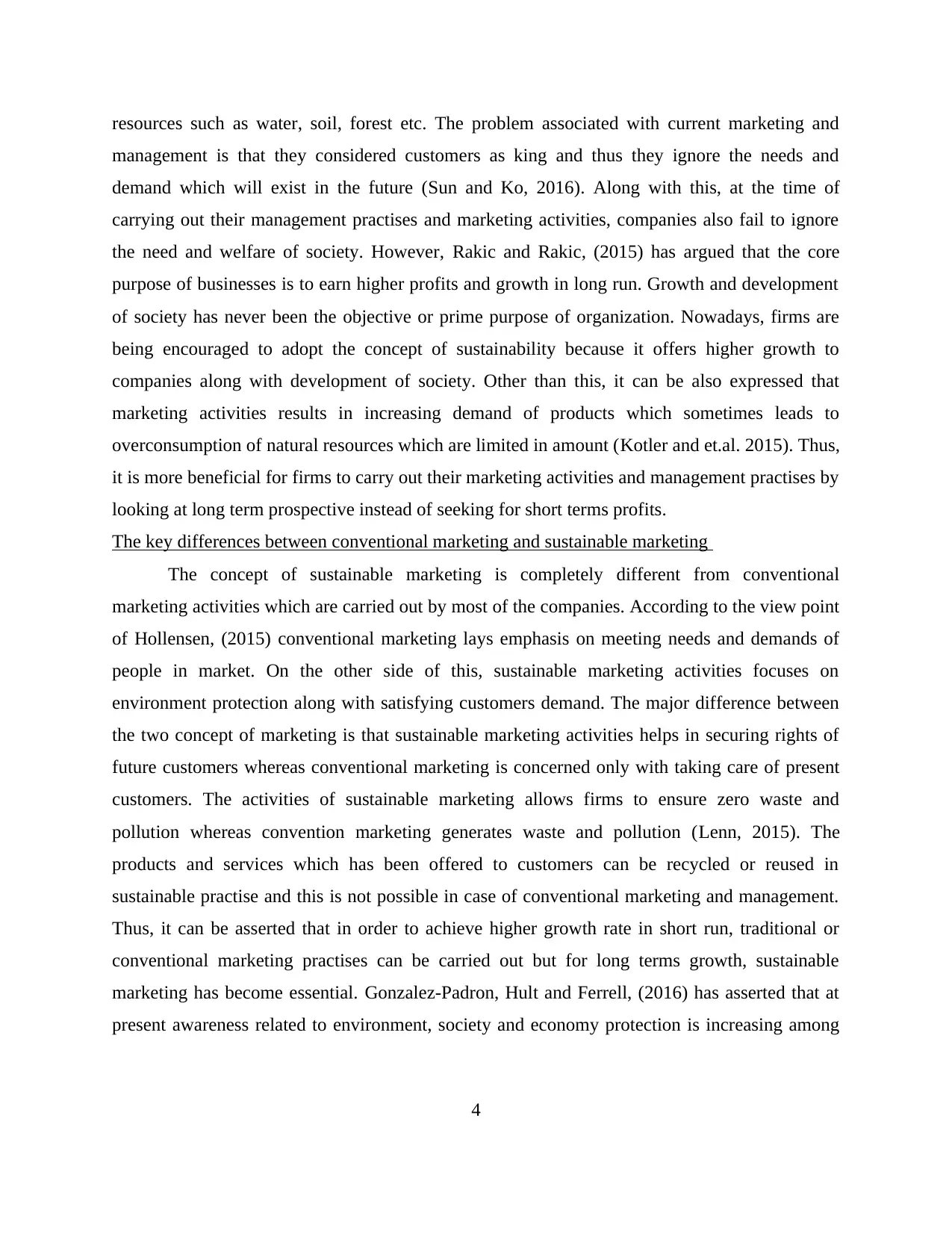
resources such as water, soil, forest etc. The problem associated with current marketing and
management is that they considered customers as king and thus they ignore the needs and
demand which will exist in the future (Sun and Ko, 2016). Along with this, at the time of
carrying out their management practises and marketing activities, companies also fail to ignore
the need and welfare of society. However, Rakic and Rakic, (2015) has argued that the core
purpose of businesses is to earn higher profits and growth in long run. Growth and development
of society has never been the objective or prime purpose of organization. Nowadays, firms are
being encouraged to adopt the concept of sustainability because it offers higher growth to
companies along with development of society. Other than this, it can be also expressed that
marketing activities results in increasing demand of products which sometimes leads to
overconsumption of natural resources which are limited in amount (Kotler and et.al. 2015). Thus,
it is more beneficial for firms to carry out their marketing activities and management practises by
looking at long term prospective instead of seeking for short terms profits.
The key differences between conventional marketing and sustainable marketing
The concept of sustainable marketing is completely different from conventional
marketing activities which are carried out by most of the companies. According to the view point
of Hollensen, (2015) conventional marketing lays emphasis on meeting needs and demands of
people in market. On the other side of this, sustainable marketing activities focuses on
environment protection along with satisfying customers demand. The major difference between
the two concept of marketing is that sustainable marketing activities helps in securing rights of
future customers whereas conventional marketing is concerned only with taking care of present
customers. The activities of sustainable marketing allows firms to ensure zero waste and
pollution whereas convention marketing generates waste and pollution (Lenn, 2015). The
products and services which has been offered to customers can be recycled or reused in
sustainable practise and this is not possible in case of conventional marketing and management.
Thus, it can be asserted that in order to achieve higher growth rate in short run, traditional or
conventional marketing practises can be carried out but for long terms growth, sustainable
marketing has become essential. Gonzalez-Padron, Hult and Ferrell, (2016) has asserted that at
present awareness related to environment, society and economy protection is increasing among
4
management is that they considered customers as king and thus they ignore the needs and
demand which will exist in the future (Sun and Ko, 2016). Along with this, at the time of
carrying out their management practises and marketing activities, companies also fail to ignore
the need and welfare of society. However, Rakic and Rakic, (2015) has argued that the core
purpose of businesses is to earn higher profits and growth in long run. Growth and development
of society has never been the objective or prime purpose of organization. Nowadays, firms are
being encouraged to adopt the concept of sustainability because it offers higher growth to
companies along with development of society. Other than this, it can be also expressed that
marketing activities results in increasing demand of products which sometimes leads to
overconsumption of natural resources which are limited in amount (Kotler and et.al. 2015). Thus,
it is more beneficial for firms to carry out their marketing activities and management practises by
looking at long term prospective instead of seeking for short terms profits.
The key differences between conventional marketing and sustainable marketing
The concept of sustainable marketing is completely different from conventional
marketing activities which are carried out by most of the companies. According to the view point
of Hollensen, (2015) conventional marketing lays emphasis on meeting needs and demands of
people in market. On the other side of this, sustainable marketing activities focuses on
environment protection along with satisfying customers demand. The major difference between
the two concept of marketing is that sustainable marketing activities helps in securing rights of
future customers whereas conventional marketing is concerned only with taking care of present
customers. The activities of sustainable marketing allows firms to ensure zero waste and
pollution whereas convention marketing generates waste and pollution (Lenn, 2015). The
products and services which has been offered to customers can be recycled or reused in
sustainable practise and this is not possible in case of conventional marketing and management.
Thus, it can be asserted that in order to achieve higher growth rate in short run, traditional or
conventional marketing practises can be carried out but for long terms growth, sustainable
marketing has become essential. Gonzalez-Padron, Hult and Ferrell, (2016) has asserted that at
present awareness related to environment, society and economy protection is increasing among
4
Paraphrase This Document
Need a fresh take? Get an instant paraphrase of this document with our AI Paraphraser
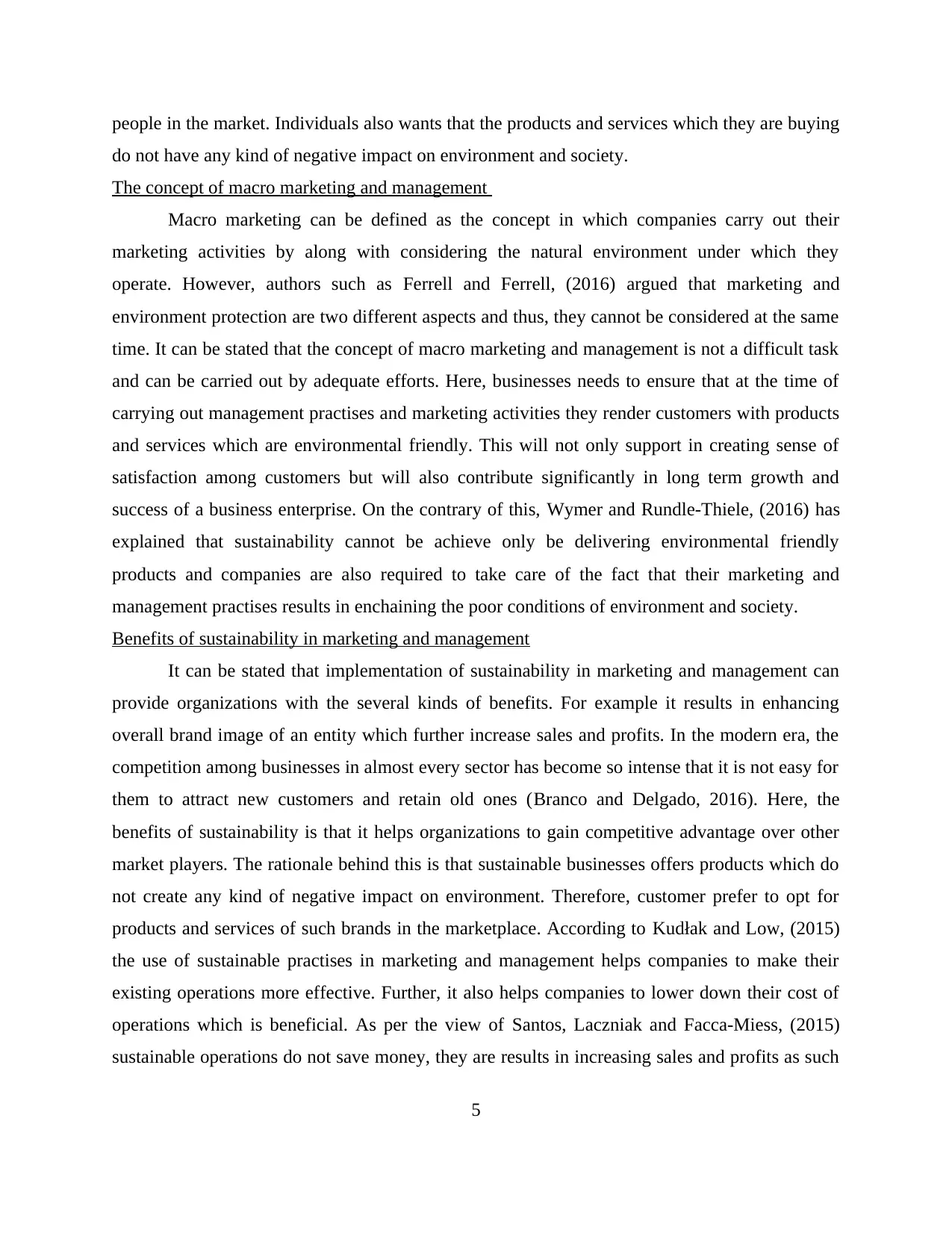
people in the market. Individuals also wants that the products and services which they are buying
do not have any kind of negative impact on environment and society.
The concept of macro marketing and management
Macro marketing can be defined as the concept in which companies carry out their
marketing activities by along with considering the natural environment under which they
operate. However, authors such as Ferrell and Ferrell, (2016) argued that marketing and
environment protection are two different aspects and thus, they cannot be considered at the same
time. It can be stated that the concept of macro marketing and management is not a difficult task
and can be carried out by adequate efforts. Here, businesses needs to ensure that at the time of
carrying out management practises and marketing activities they render customers with products
and services which are environmental friendly. This will not only support in creating sense of
satisfaction among customers but will also contribute significantly in long term growth and
success of a business enterprise. On the contrary of this, Wymer and Rundle-Thiele, (2016) has
explained that sustainability cannot be achieve only be delivering environmental friendly
products and companies are also required to take care of the fact that their marketing and
management practises results in enchaining the poor conditions of environment and society.
Benefits of sustainability in marketing and management
It can be stated that implementation of sustainability in marketing and management can
provide organizations with the several kinds of benefits. For example it results in enhancing
overall brand image of an entity which further increase sales and profits. In the modern era, the
competition among businesses in almost every sector has become so intense that it is not easy for
them to attract new customers and retain old ones (Branco and Delgado, 2016). Here, the
benefits of sustainability is that it helps organizations to gain competitive advantage over other
market players. The rationale behind this is that sustainable businesses offers products which do
not create any kind of negative impact on environment. Therefore, customer prefer to opt for
products and services of such brands in the marketplace. According to Kudłak and Low, (2015)
the use of sustainable practises in marketing and management helps companies to make their
existing operations more effective. Further, it also helps companies to lower down their cost of
operations which is beneficial. As per the view of Santos, Laczniak and Facca-Miess, (2015)
sustainable operations do not save money, they are results in increasing sales and profits as such
5
do not have any kind of negative impact on environment and society.
The concept of macro marketing and management
Macro marketing can be defined as the concept in which companies carry out their
marketing activities by along with considering the natural environment under which they
operate. However, authors such as Ferrell and Ferrell, (2016) argued that marketing and
environment protection are two different aspects and thus, they cannot be considered at the same
time. It can be stated that the concept of macro marketing and management is not a difficult task
and can be carried out by adequate efforts. Here, businesses needs to ensure that at the time of
carrying out management practises and marketing activities they render customers with products
and services which are environmental friendly. This will not only support in creating sense of
satisfaction among customers but will also contribute significantly in long term growth and
success of a business enterprise. On the contrary of this, Wymer and Rundle-Thiele, (2016) has
explained that sustainability cannot be achieve only be delivering environmental friendly
products and companies are also required to take care of the fact that their marketing and
management practises results in enchaining the poor conditions of environment and society.
Benefits of sustainability in marketing and management
It can be stated that implementation of sustainability in marketing and management can
provide organizations with the several kinds of benefits. For example it results in enhancing
overall brand image of an entity which further increase sales and profits. In the modern era, the
competition among businesses in almost every sector has become so intense that it is not easy for
them to attract new customers and retain old ones (Branco and Delgado, 2016). Here, the
benefits of sustainability is that it helps organizations to gain competitive advantage over other
market players. The rationale behind this is that sustainable businesses offers products which do
not create any kind of negative impact on environment. Therefore, customer prefer to opt for
products and services of such brands in the marketplace. According to Kudłak and Low, (2015)
the use of sustainable practises in marketing and management helps companies to make their
existing operations more effective. Further, it also helps companies to lower down their cost of
operations which is beneficial. As per the view of Santos, Laczniak and Facca-Miess, (2015)
sustainable operations do not save money, they are results in increasing sales and profits as such
5
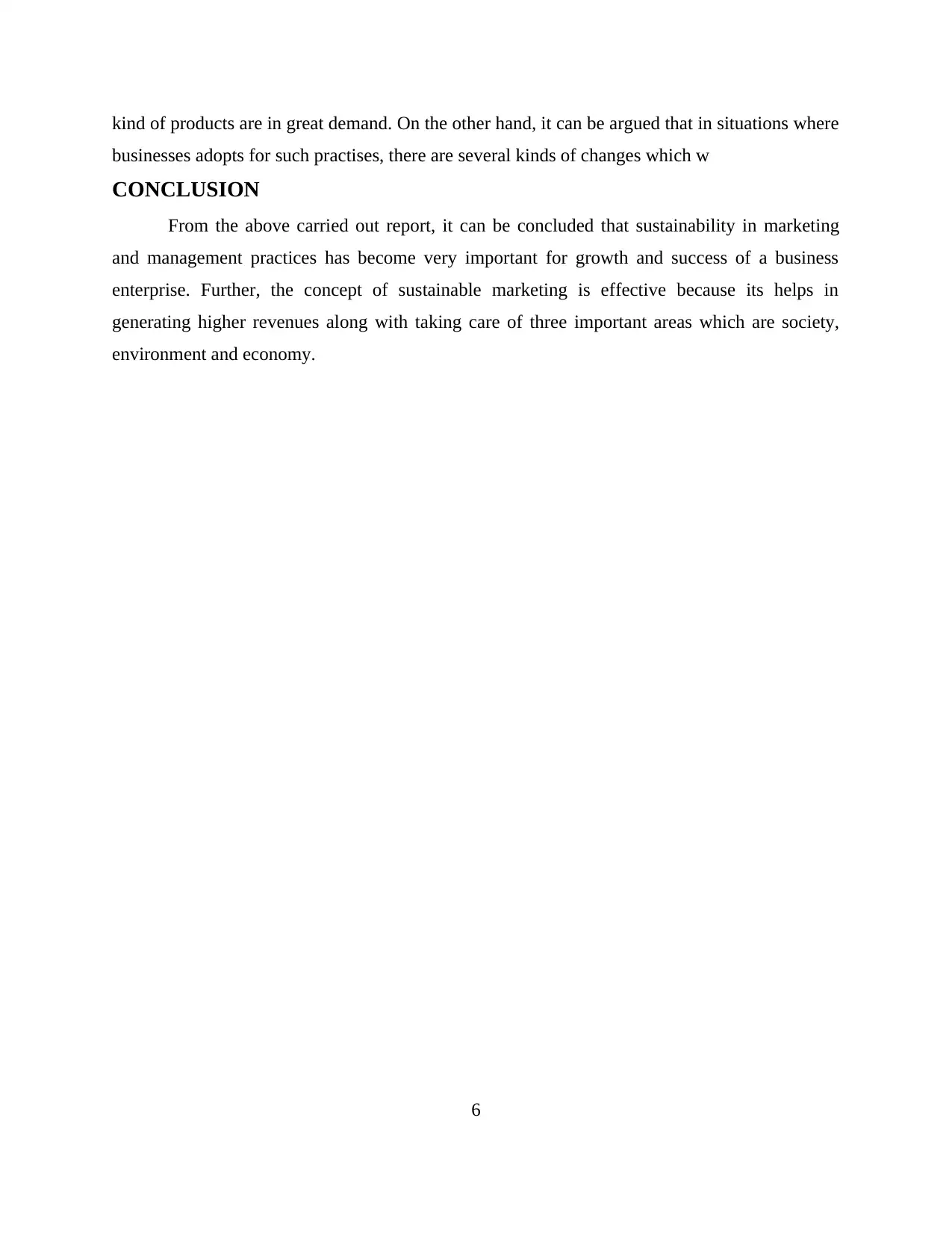
kind of products are in great demand. On the other hand, it can be argued that in situations where
businesses adopts for such practises, there are several kinds of changes which w
CONCLUSION
From the above carried out report, it can be concluded that sustainability in marketing
and management practices has become very important for growth and success of a business
enterprise. Further, the concept of sustainable marketing is effective because its helps in
generating higher revenues along with taking care of three important areas which are society,
environment and economy.
6
businesses adopts for such practises, there are several kinds of changes which w
CONCLUSION
From the above carried out report, it can be concluded that sustainability in marketing
and management practices has become very important for growth and success of a business
enterprise. Further, the concept of sustainable marketing is effective because its helps in
generating higher revenues along with taking care of three important areas which are society,
environment and economy.
6
⊘ This is a preview!⊘
Do you want full access?
Subscribe today to unlock all pages.

Trusted by 1+ million students worldwide
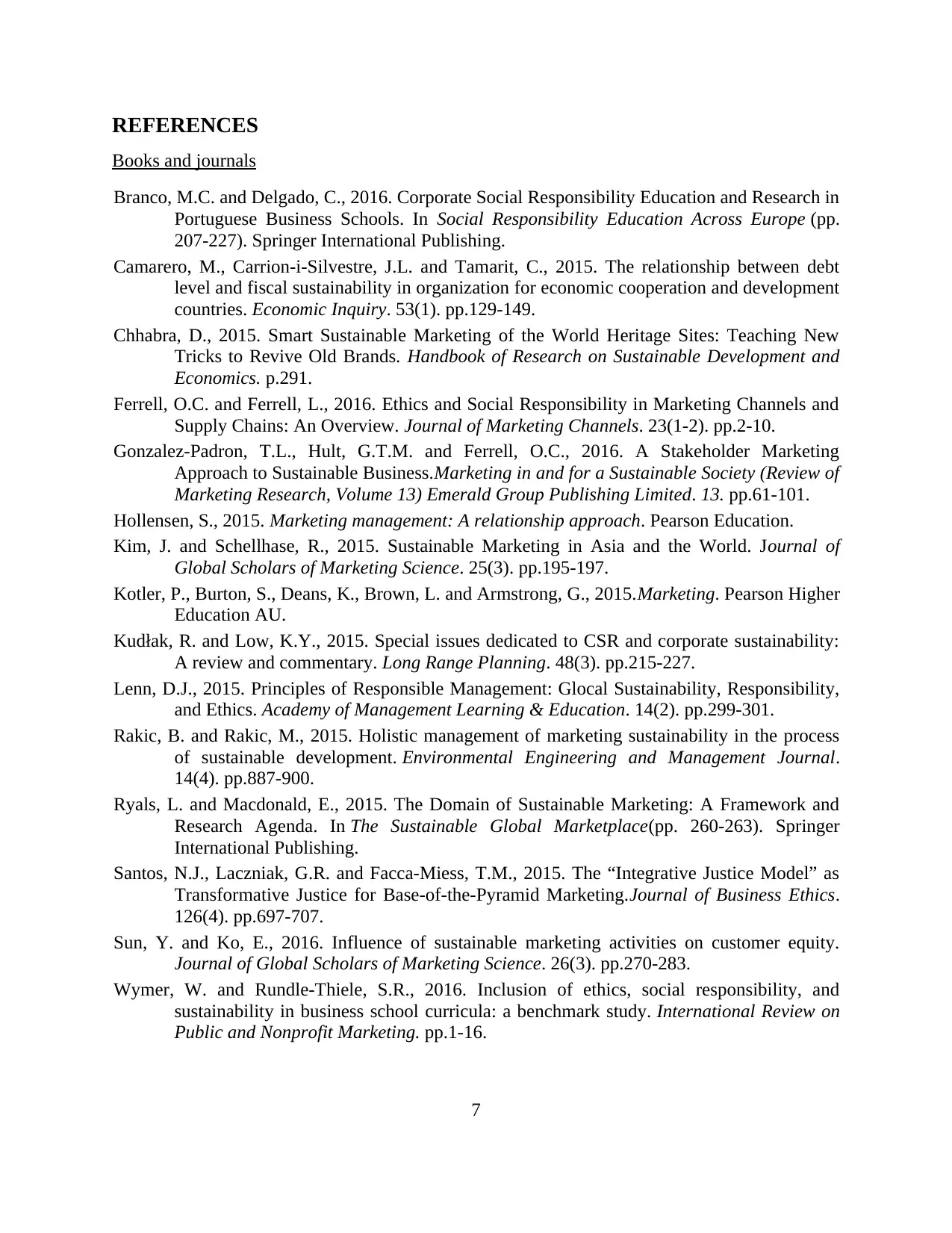
REFERENCES
Books and journals
Branco, M.C. and Delgado, C., 2016. Corporate Social Responsibility Education and Research in
Portuguese Business Schools. In Social Responsibility Education Across Europe (pp.
207-227). Springer International Publishing.
Camarero, M., Carrion‐i‐Silvestre, J.L. and Tamarit, C., 2015. The relationship between debt
level and fiscal sustainability in organization for economic cooperation and development
countries. Economic Inquiry. 53(1). pp.129-149.
Chhabra, D., 2015. Smart Sustainable Marketing of the World Heritage Sites: Teaching New
Tricks to Revive Old Brands. Handbook of Research on Sustainable Development and
Economics. p.291.
Ferrell, O.C. and Ferrell, L., 2016. Ethics and Social Responsibility in Marketing Channels and
Supply Chains: An Overview. Journal of Marketing Channels. 23(1-2). pp.2-10.
Gonzalez-Padron, T.L., Hult, G.T.M. and Ferrell, O.C., 2016. A Stakeholder Marketing
Approach to Sustainable Business.Marketing in and for a Sustainable Society (Review of
Marketing Research, Volume 13) Emerald Group Publishing Limited. 13. pp.61-101.
Hollensen, S., 2015. Marketing management: A relationship approach. Pearson Education.
Kim, J. and Schellhase, R., 2015. Sustainable Marketing in Asia and the World. Journal of
Global Scholars of Marketing Science. 25(3). pp.195-197.
Kotler, P., Burton, S., Deans, K., Brown, L. and Armstrong, G., 2015.Marketing. Pearson Higher
Education AU.
Kudłak, R. and Low, K.Y., 2015. Special issues dedicated to CSR and corporate sustainability:
A review and commentary. Long Range Planning. 48(3). pp.215-227.
Lenn, D.J., 2015. Principles of Responsible Management: Glocal Sustainability, Responsibility,
and Ethics. Academy of Management Learning & Education. 14(2). pp.299-301.
Rakic, B. and Rakic, M., 2015. Holistic management of marketing sustainability in the process
of sustainable development. Environmental Engineering and Management Journal.
14(4). pp.887-900.
Ryals, L. and Macdonald, E., 2015. The Domain of Sustainable Marketing: A Framework and
Research Agenda. In The Sustainable Global Marketplace(pp. 260-263). Springer
International Publishing.
Santos, N.J., Laczniak, G.R. and Facca-Miess, T.M., 2015. The “Integrative Justice Model” as
Transformative Justice for Base-of-the-Pyramid Marketing.Journal of Business Ethics.
126(4). pp.697-707.
Sun, Y. and Ko, E., 2016. Influence of sustainable marketing activities on customer equity.
Journal of Global Scholars of Marketing Science. 26(3). pp.270-283.
Wymer, W. and Rundle-Thiele, S.R., 2016. Inclusion of ethics, social responsibility, and
sustainability in business school curricula: a benchmark study. International Review on
Public and Nonprofit Marketing. pp.1-16.
7
Books and journals
Branco, M.C. and Delgado, C., 2016. Corporate Social Responsibility Education and Research in
Portuguese Business Schools. In Social Responsibility Education Across Europe (pp.
207-227). Springer International Publishing.
Camarero, M., Carrion‐i‐Silvestre, J.L. and Tamarit, C., 2015. The relationship between debt
level and fiscal sustainability in organization for economic cooperation and development
countries. Economic Inquiry. 53(1). pp.129-149.
Chhabra, D., 2015. Smart Sustainable Marketing of the World Heritage Sites: Teaching New
Tricks to Revive Old Brands. Handbook of Research on Sustainable Development and
Economics. p.291.
Ferrell, O.C. and Ferrell, L., 2016. Ethics and Social Responsibility in Marketing Channels and
Supply Chains: An Overview. Journal of Marketing Channels. 23(1-2). pp.2-10.
Gonzalez-Padron, T.L., Hult, G.T.M. and Ferrell, O.C., 2016. A Stakeholder Marketing
Approach to Sustainable Business.Marketing in and for a Sustainable Society (Review of
Marketing Research, Volume 13) Emerald Group Publishing Limited. 13. pp.61-101.
Hollensen, S., 2015. Marketing management: A relationship approach. Pearson Education.
Kim, J. and Schellhase, R., 2015. Sustainable Marketing in Asia and the World. Journal of
Global Scholars of Marketing Science. 25(3). pp.195-197.
Kotler, P., Burton, S., Deans, K., Brown, L. and Armstrong, G., 2015.Marketing. Pearson Higher
Education AU.
Kudłak, R. and Low, K.Y., 2015. Special issues dedicated to CSR and corporate sustainability:
A review and commentary. Long Range Planning. 48(3). pp.215-227.
Lenn, D.J., 2015. Principles of Responsible Management: Glocal Sustainability, Responsibility,
and Ethics. Academy of Management Learning & Education. 14(2). pp.299-301.
Rakic, B. and Rakic, M., 2015. Holistic management of marketing sustainability in the process
of sustainable development. Environmental Engineering and Management Journal.
14(4). pp.887-900.
Ryals, L. and Macdonald, E., 2015. The Domain of Sustainable Marketing: A Framework and
Research Agenda. In The Sustainable Global Marketplace(pp. 260-263). Springer
International Publishing.
Santos, N.J., Laczniak, G.R. and Facca-Miess, T.M., 2015. The “Integrative Justice Model” as
Transformative Justice for Base-of-the-Pyramid Marketing.Journal of Business Ethics.
126(4). pp.697-707.
Sun, Y. and Ko, E., 2016. Influence of sustainable marketing activities on customer equity.
Journal of Global Scholars of Marketing Science. 26(3). pp.270-283.
Wymer, W. and Rundle-Thiele, S.R., 2016. Inclusion of ethics, social responsibility, and
sustainability in business school curricula: a benchmark study. International Review on
Public and Nonprofit Marketing. pp.1-16.
7
1 out of 7
Related Documents
Your All-in-One AI-Powered Toolkit for Academic Success.
+13062052269
info@desklib.com
Available 24*7 on WhatsApp / Email
![[object Object]](/_next/static/media/star-bottom.7253800d.svg)
Unlock your academic potential
Copyright © 2020–2025 A2Z Services. All Rights Reserved. Developed and managed by ZUCOL.





